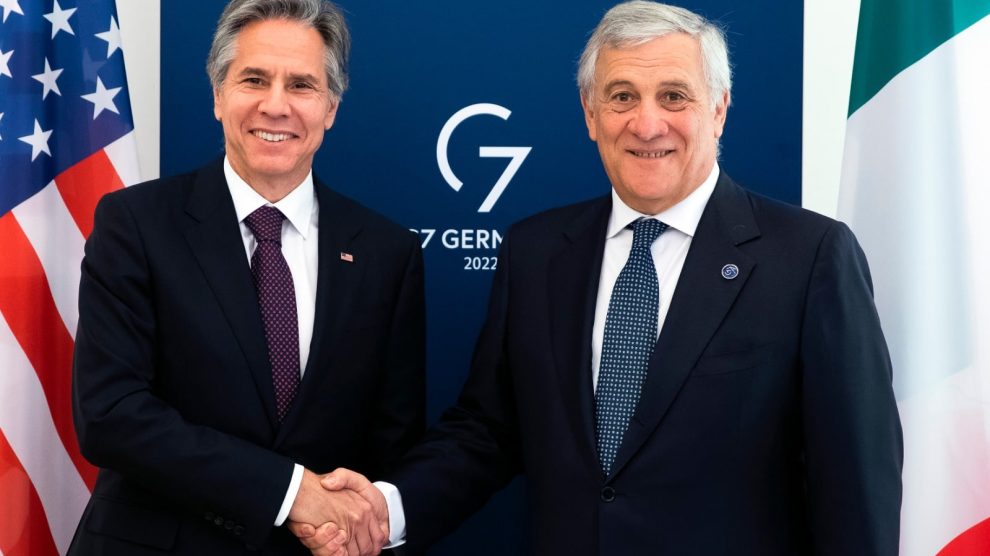Italy reaches out to the US as it begins leading the G-7. On Tuesday, Italian Foreign Minister Antonio Tajani spoke over the phone with US Secretary of State Antony Blinken, his first initiative since Rome took over the Group of Seven’s rotating presidentship from Tokyo. The two spoke for forty minutes, delving into a plethora of issues and exploring avenues for coordination during what’s looking like a challenge-ridden year.
- “I thanked my friend Antony for supporting our agenda, which is clear proof of how strong the transatlantic bond is,” remarked FM Tajani, noting that the “deep friendship that binds Rome and Washington will allow us to converge with the other G-7 partners on concrete actions that will benefit everyone.”
Upholding global freedom. According to a Foreign Ministry communiqué, the Italian G-7 Presidency “will have among its priorities first and foremost [the] respect for the international order, which has been profoundly shaken by the Russian war in Ukraine and the conflict in the Middle East, two issues on which Italy will keep the attention of its partners and the international community high.”
- FM Tajani also confirmed to Secretary Blinken that Rome’s G-7 presidency “will look with great attention to the Indo-Pacific, a region in strong growth and in which there is growing competition.”
- Artificial intelligence will also be central to the forum, as Rome intends to favour the creation of international regulation so as to keep it human-centric and adherent to democratic principles.
Keep in focus: the Middle East. The note from Secretary Blinken’s side stated that he “underscored the urgency of addressing the humanitarian crisis in Gaza and preventing the escalation of the conflict.” On his part, FM Tajani “thanked the US for its constructive stance” in reaching the December 22 UN resolution on humanitarian assistance, reiterating the UN’s centrality in resolving the crisis.
- They also discussed the importance of “collective multilateral action” to address “threats to global interests posed by Iranian-backed Houthi attacks on commercial shipping in the Red Sea,” according to the US readout.
Keep in focus: Ukraine. “Rome and Washington are working together for a just and lasting peace. Kyiv can count on our support. We will also reiterate this together with the G-7 partners,” said the Italian FM after the call. The duo “reiterated stalwart support for Ukraine in 2024 as it continues to combat Russia’s war of aggression,” according to the US note.
- The Italian government has signalled it will keep assisting Ukraine with military and humanitarian equipment in 2024, with FM Tajani stressing that reconstruction efforts will also be central to the G-7 process.
From the Med to the world. Rome’s presidency will find its “natural projection” in the Mediterranean, reads the note, “where we have a responsibility to promote solutions that foster peace and stability for the entire region.” Besides the Middle East and Ukraine, the Balkans will also enjoy a “central” role in view of their “strategic importance for the stability of the whole of Europe.”
- Also, Italy will direct the G-7’s gaze to Africa, where it plans to “promote equal, effective and mutually beneficial partnerships with African countries, for the security and resilience of the continent.”
- “The stability, security and prosperity of the Mediterranean and the African continent are central” to the forum’s agenda, stressed FM Tajani during the call.
- This focus overlaps with the G-20’s attention to the Global South, as Italy actively worked with India’s 2023 presidentship to bring the African Union into the fold and is pushing to reform the United Nations Security Council into a more democratic and representative institution.




